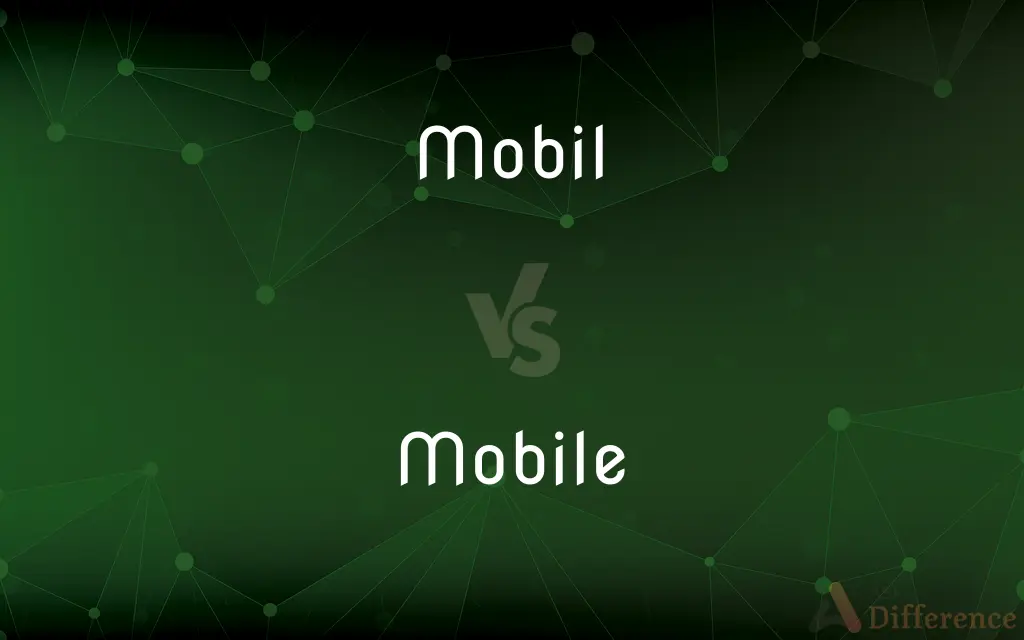Mobil vs. Mobile — Which is Correct Spelling?
Edited by Tayyaba Rehman — By Fiza Rafique — Updated on March 19, 2024
"Mobil" is an incorrect spelling for general contexts, while "Mobile" is correct, referring to movement or ability to move. Note: "Mobil" is a brand of oil and gas products.

Table of Contents
Which is correct: Mobil or Mobile
How to spell Mobile?

Mobil
Incorrect Spelling

Mobile
Correct Spelling
ADVERTISEMENT
Key Differences
"Mobile" has the same ending as "automobile," which is about movement.
Associate "Mobile" with the mobile phone – an everyday item.
Recollect cities named "Mobile," such as Mobile, Alabama.
Remember the "e" in "Mobile" as it echoes "move."
Think of "Mobile" with the "e" as representing "ease of movement."
ADVERTISEMENT
How Do You Spell Mobile Correctly?
Incorrect: She couldn't find her mobil in the morning.
Correct: She couldn't find her mobile in the morning.
Incorrect: He bought a new mobil phone yesterday.
Correct: He bought a new mobile phone yesterday.
Incorrect: The company launched a new mobil application.
Correct: The company launched a new mobile application.
Incorrect: The mobil version of the website isn't working well.
Correct: The mobile version of the website isn't working well.
Incorrect: Can you give me your mobil number?
Correct: Can you give me your mobile number?
Mobile Definitions
Able to move or be moved freely or easily
He has a weight problem and is not very mobile
Highly mobile international capital
Relating to mobile phones, handheld computers, and similar technology
A mobile device
The next generation of mobile networks
Able or willing to move easily or freely between occupations, places of residence, or social classes
An increasingly mobile society
An industrial city and port on the coast of southern Alabama; population 191,022 (est. 2008).
Capable of moving or of being moved readily from place to place
A mobile organism.
A mobile missile system.
Of or relating to wireless communication devices, such as cellphones.
Capable of moving or changing quickly from one state or condition to another
A mobile, expressive face.
Fluid; unstable
A mobile situation following the coup.
Marked by the easy intermixing of different social groups
A mobile community.
Moving relatively easily from one social class or level to another
An upwardly mobile generation.
Tending to travel and relocate frequently
A restless, mobile society.
Flowing freely; fluid
A mobile liquid.
(mōbēl′) A type of sculpture consisting of carefully equilibrated parts that move, especially in response to air currents.
A mobile phone.
Capable of being moved, especially on wheels.
A mobile home
Pertaining to or by agency of mobile phones.
Mobile number
Mobile internet
Characterized by an extreme degree of fluidity; moving or flowing with great freedom.
Mercury is a mobile liquid.
Easily moved in feeling, purpose, or direction; excitable; changeable; fickle.
Changing in appearance and expression under the influence of the mind.
Mobile features
(biology) Capable of being moved, aroused, or excited; capable of spontaneous movement.
(arts) A kinetic sculpture or decorative arrangement made of items hanging so that they can move independently from each other.
Senseid|en|Q17517}} {{ellipsis of mobile phone
The internet accessed via mobile devices.
There are many business opportunities in mobile
One who or moves, or who can move (e.g. to travel to a different place).
Capable of being moved; not fixed in place or condition; movable.
Characterized by an extreme degree of fluidity; moving or flowing with great freedom; as, benzine and mercury are mobile liquids; - opposed to viscous, viscoidal, or oily.
Changing in appearance and expression under the influence of the mind; as, mobile features.
Capable of being moved, aroused, or excited; capable of spontaneous movement.
Capable of moving readily, or moving frequenty from place to place; as, a mobile work force.
Having motor vehicles to permit movement from place to place; as, a mobile library; a mobile hospital.
The mob; the populace.
A form of sculpture having several sheets or rods of a stiff material attached to each other by thin wire or twine in a balanced and artfully arranged tree configuration, with the topmost member suspended in air from a support so that the parts may move independently when set in motion by a current of air.
A river in southwestern Alabama; flows into Mobile Bay
A port in southwestern Alabama on Mobile Bay
Sculpture suspended in midair whose delicately balanced parts can be set in motion by air currents
Moving or capable of moving readily (especially from place to place);
A mobile missile system
The tongue is...the most mobile articulator
(of groups of people) tending to travel and change settlements frequently;
A restless mobile society
The nomadic habits of the Bedouins
Believed the profession of a peregrine typist would have a happy future
Wandering tribes
Having transportation available
Capable of changing quickly from one state or condition to another;
A highly mobile face
Affording change (especially in social status);
Britain is not a truly fluid society
Upwardly mobile
Capable of moving or being moved easily.
The sculpture was mobile and could be rotated.
Relating to cellular phones or devices.
She got a new mobile phone.
A decorative structure that is suspended so as to turn freely.
The baby's mobile hung above the crib.
Changing in location or direction.
He had a mobile lifestyle due to his job.
Showing the ability to move between different levels of society.
She came from a mobile social background.
Mobile Meaning in a Sentence
His mobile ran out of battery while he was on the call.
She downloaded a game on her mobile and played it all afternoon.
He updated the operating system on his mobile last night.
She misplaced her mobile and found it in the refrigerator.
The children use their parent's mobile to watch cartoons.
I use my mobile to keep track of my daily tasks.
She received a notification on her mobile about the sale.
She set up a mobile hotspot to share her internet connection.
The new mobile model features an improved battery life.
He prefers using his mobile for navigation instead of a traditional map.
The mobile app allows users to order food from local restaurants.
The latest mobile games are very impressive in terms of graphics.
Mobile technology has significantly evolved over the past decade.
He dropped his mobile but fortunately, the screen didn't crack.
The mobile signal was weak in the rural area they visited.
The convenience of mobile payment has reduced the need for cash.
She uses a mobile app to track her workouts and progress.
He bought a protective case for his new mobile.
Mobile banking has made it easier to manage finances on the go.
He uses his mobile as an alarm clock every morning.
She reads news articles on her mobile during her commute.
Their mobile plan includes unlimited data, which is very convenient.
Common Curiosities
Which vowel is used before Mobile?
The vowel "i" is used before the "l" in "mobile."
What is the root word of Mobile?
The root word is the Latin "mobilis."
Why is it called Mobile?
It is derived from the Latin word "mobilis," meaning "movable" or "capable of moving."
What is the pronunciation of Mobile?
"Mobile" can be pronounced as /ˈmoʊ.bəl/ or /moʊˈbil/, depending on the context and region.
What is the verb form of Mobile?
The related verb is "mobilize."
What is the singular form of Mobile?
The singular form is "mobile."
Which article is used with Mobile?
Both "a" and "the" can be used with "mobile."
Is Mobile a negative or positive word?
"Mobile" is neutral.
Is Mobile an adverb?
No, "mobile" is not an adverb.
Is Mobile an abstract noun?
No, it's primarily a concrete noun or an adjective.
What is the plural form of Mobile?
The plural form is "mobiles."
Which preposition is used with Mobile?
Prepositions like "on," "with," and "in" can be used with "mobile," depending on the context.
Is the Mobile term a metaphor?
No, "mobile" itself is not a metaphor but can be used in metaphorical contexts.
Is the word Mobile a gerund?
No, "mobile" is not a gerund.
What is a stressed syllable in Mobile?
The stressed syllable can be "mo-" or "bile," depending on regional pronunciations.
Which conjunction is used with Mobile?
Standard conjunctions like "and," "or," and "but" can be used with "mobile."
Is Mobile a vowel or consonant?
"Mobile" is a word that contains both vowels and consonants.
Is Mobile a countable noun?
Yes, "mobile" (as in the decorative structure or phone) is countable.
What is the opposite of Mobile?
The opposite could be "immobile" or "stationary."
Is Mobile a collective noun?
No, "mobile" is not a collective noun.
Is the word “Mobile” a Direct object or an Indirect object?
"Mobile" can be either, depending on its use in a sentence.
Which determiner is used with Mobile?
Determiners like "this," "that," "my," or "the" can be used with "mobile."
Is Mobile a noun or adjective?
"Mobile" can be both a noun and an adjective, depending on its usage.
How many syllables are in Mobile?
There are two syllables in "mobile."
How do we divide Mobile into syllables?
"Mobile" can be divided as mo-bile.
What part of speech is Mobile?
"Mobile" can be both an adjective and a noun.
What is another term for Mobile?
Another term could be "movable" or "cell phone" (in the context of telecommunications).
What is the second form of Mobile?
"Mobile" doesn't have verb forms.
What is the third form of Mobile?
"Mobile" doesn't have verb forms.
Is the word Mobile imperative?
No, "mobile" is not imperative.
What is the first form of Mobile?
As "mobile" is primarily a noun or adjective, it doesn't have verb forms.
How is Mobile used in a sentence?
"He bought a new mobile phone."
Share Your Discovery

Previous Comparison
Drunked vs. Drunk
Next Comparison
Syrop vs. SyrupAuthor Spotlight
Written by
Fiza RafiqueFiza Rafique is a skilled content writer at AskDifference.com, where she meticulously refines and enhances written pieces. Drawing from her vast editorial expertise, Fiza ensures clarity, accuracy, and precision in every article. Passionate about language, she continually seeks to elevate the quality of content for readers worldwide.
Edited by
Tayyaba RehmanTayyaba Rehman is a distinguished writer, currently serving as a primary contributor to askdifference.com. As a researcher in semantics and etymology, Tayyaba's passion for the complexity of languages and their distinctions has found a perfect home on the platform. Tayyaba delves into the intricacies of language, distinguishing between commonly confused words and phrases, thereby providing clarity for readers worldwide.













































